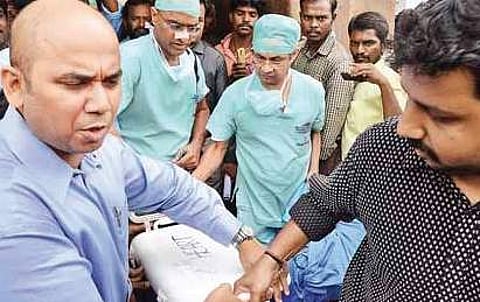

CHENNAI: In the 80s and early 90s, the south of Chennai was the hub of organ commerce, and the story of city’s kidney trade drew eyes of even the international media to Villivakkam, which was known as ‘Kidneyvakkam’. While the implementation of the Transplantation of Human Organs Act 1994 (THOA) seemed futile in curbing the organ trade racket, a handful of good samaritans changed the face of the despicable situation. From a dark age of organ commerce to spearheading cadaver organ transplant, Chennai has come a long way, in both organ donation and transplant.
Ahead of a Madras Day talk on ‘Why Chennai is the organ transplant capital’, Dr Sunil Shroff, urologist and managing trustee, MOHAN (Multi Organ Harvesting Aid Network) Foundation, shares the unique history of the city.
Since 2008, a total of 5,385 transplants have been done in the Tamil Nadu, according to Transplant Authority of Tamil Nadu (TRANSTAN). “This is the city where the first kidney transplant programme began. In fact, the word ‘medical tourism’ which has been creating a buzz started with the success rates of transplants in the city,” explains Dr Shroff.
With medical expertise on complex procedures, the city became the most preferred destination for people across the globe for a transplant. “We have made the certification of brain death mandatory and have also been successful in making conversations about organ donation; the topic was often overlooked,” he says.
From successfully creating a green corridor to transport an organ, to creating a healthy network between hospitals for organ sharing, the city is an enviable model. “Many States want to duplicate the model we follow here. For example, Kerala adopted our model and from no organ donation rate, their numbers have gone up. Similarly, other states including Rajasthan, Odisha and Assam are seeking help from us,” he shares.
But despite creating awareness about organ donation, disaster struck the State again in 2007. “Post tsunami there were a lot of problems and the State and the city was slammed by a massive kidney scam. It was shocking to find out that people were willing to sell their organs for money. On the one hand they were homeless and on the other, they wanted to make ends meet by selling their organs!” explains Shroff.
But, the government decided to step in. “Having the right people at the right time made a huge difference. With the help and participation of different stakeholders including government, NGOs, health department, and private hospitals, several awareness and sensitisation programmes were conducted on cadaver organ donations,” recalls Shroff.
Since then, the city has been in the forefront of organ donations and transplants, not only in India but also in the whole of South East Asia. “Madras Day usually focuses on, monuments and more of the culture of the city. But, I thought a story about our medical history is worth sharing,” he avers. “The first hospital in the whole of Madras Presidency was set up in Fort St George in 1664 and our transplant history goes back to the 70s. So, this part of history has to be shared.”
Talking about factors that have made Chennai a successful city in organ transplant, Shroff points to capacity building exercises. “We have been training people as transplant coordinators and ICU specialists and we need more of them. They work along with the families of the deceased and seek consent for donation. So, having effective coordinators helped in the number of organ donations in the city,” he avers.
Looking at a possibility of a transplant institute in the future, he is sure about the city going beyond transplanting organs. “If anything better, we will be having more transplants of intestine, pancreas, hand, and face-composite tissues. And there will be a betterment in immuno-suppression and also induce tolerance in the recipient during transplants. We will also be in the forefront of genetic engineering. We have the infrastructure to do it and I know we can give better results,”
he adds.
Dr Sunil Shroff’s talk ‘Why Chennai is the organ transplant capital’ will be held on August 25 at Hotel Raintree, Anna Salai, at 6 pm